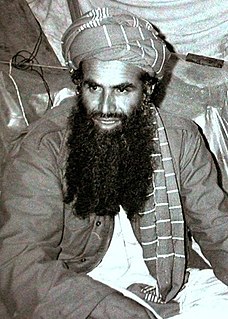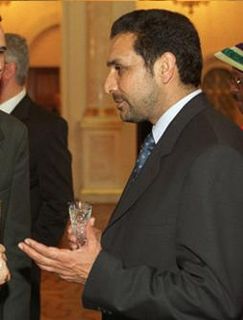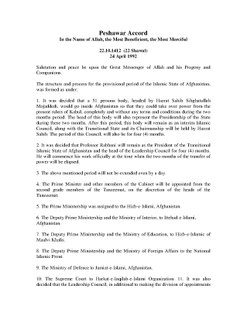
Ahmad Shah Massoud was an Afghan politician and military commander. He was a powerful guerrilla commander during the resistance against the Soviet occupation between 1979 and 1989. In the 1990s, he led the government's military wing against rival militias; after the Taliban takeover, he was the leading opposition commander against their regime until his assassination in 2001.

Abdulrab Rasul Sayyaf is an exiled Afghan politician and former mujahideen commander. He took part in the war against the Marxist–Leninist People's Democratic Party of Afghanistan (PDPA) government in the 1980s, leading the Afghan mujahideen faction Ittehad-al-Islami.

Mawlawi Mohammad Yunus Khalis was a mujahideen commander in Afghanistan during the Soviet–Afghan War. His party was called Hezb-i-Islami, the same as Gulbuddin Hekmatyar's party. The two are commonly differentiated as Hezb-e Islami Khalis and Hezb-e-Islami Gulbuddin.

The Northern Alliance, officially known as the United Islamic National Front for the Salvation of Afghanistan, was a military alliance of groups that operated between late 1996 to 2001 after the Islamic Emirate of Afghanistan (Taliban) took over Kabul. The United Front was originally assembled by key leaders of the Islamic State of Afghanistan, particularly president Burhanuddin Rabbani and former Defense Minister Ahmad Shah Massoud. Initially it included mostly Tajiks but by 2000, leaders of other ethnic groups had joined the Northern Alliance. This included Karim Khalili, Abdul Rashid Dostum, Abdullah Abdullah, Mohammad Mohaqiq, Abdul Qadir, Asif Mohseni, Amrullah Saleh and others.

The Hezb-e-Islami Gulbuddin, also referred to as Hezb-e-Islami or Hezb-i-Islami Afghanistan (HIA), is an Afghan political party and former militia, originally founded in 1976 as Hezb-e-Islami and led by Gulbuddin Hekmatyar. In 1979, Mulavi Younas Khalis split with Hekmatyar and established his own group, which became known as Hezb-i Islami Khalis; the remaining part of Hezb-e Islami, still headed by Hekmatyar, became known as Hezb-e Islami Gulbuddin. Hezbi Islami seeks to emulate the Muslim Brotherhood and to replace the various tribal factions of Afghanistan with one unified Islamic state. This puts them at odds with the more tribe-oriented Taliban.

Haji Abdul Qadeer was a prominent Northern Alliance leader in Afghanistan and opposed the Taliban. Originally a commander of the Hezb-i Islami Khalis faction during the Soviet–Afghan War, he then served as governor of Nangarhar Province, the head of the Eastern Afghanistan Shura, and later Vice President of Afghanistan and Minister of Public Works in the administration of Hamid Karzai from 19 June 2002 until his assassination on 6 July 2002. He was the older brother of fellow anti-Soviet and Northern Alliance commander Abdul Haq, who was executed in late 2001 by the Taliban. Abdul Qadeer is notable for welcoming Osama bin Laden to Jalalabad in 1996.

Ahmad Zia Massoud is an Afghan politician who was the Vice President of Afghanistan in the first elected administration of President Hamid Karzai, from December 2004 to November 2009. He is a younger brother of the late Ahmad Shah Massoud, the resistance leader against the Soviet invasion of Afghanistan and against the Taliban. In late 2011, Ahmad Zia Massoud joined hands with major leaders in the National Front of Afghanistan, which strongly opposed a return of the Taliban to power. The National Front was generally regarded as a reformation of the United Front which with U.S. air support temporarily removed the Taliban from power in late 2001.

Abdul Haq was an Afghan mujahideen commander who fought against the Soviet-backed People's Democratic Party of Afghanistan, the de facto Afghan government in the 1980s. He was killed by the Taliban in October 2001 while trying to create a popular uprising against the Taliban in Afghanistan in the wake of the September 11th attacks.

The 1989–1992 Afghan Civil War took place between the Soviet withdrawal from Afghanistan on 15 February 1989 until 27 April 1992, the day after the proclamation of the Peshawar Accords proclaiming a new interim Afghan government which was supposed to start serving on 28 April 1992.

The 1992–1996 Afghan Civil War took place between 28 April 1992—the date a new interim Afghan government was supposed to replace the Republic of Afghanistan of President Mohammad Najibullah—and the Taliban's conquest of Kabul establishing the Islamic Emirate of Afghanistan on 27 September 1996.
Afghan Arabs are Arab and other Muslim Islamist mujahideen who came to Afghanistan during and following the Soviet–Afghan War to help fellow Muslims fight Soviets and pro-Soviet Afghans.

National Islamic Front of Afghanistan is a political party in Afghanistan. It has been led, since its founding, by members of a prominent Sufi family, the Gailani. It is primarily a Pashtun party, followers of the Sufi holy man Pir Sayed Ahmed Gailani have a reputation for moderate thought and the traditional mystical and introspective religious currents that characterize Sufism in that sect.
Hajji Din Mohammad also known as Azizullah Din Mohammad is a politician in Afghanistan who served as the Governor of Nangarhar Province followed by Governor of Kabul Province. He is currently the Chairman of Peace and Development Islamic Party. He has been involved in the peace and reconciliation process between the Afghan Government and the Taliban and is currently the deputy of High Council for National Reconciliation. Haji Din Mohammad comes from a distinguished Pashtun family "Arsala" The Arsala family is part of the Jabar Khel. He is also the elder brother of late Hajji Abdul Qadir and Abdul Haq His great-grandfather, Wazir Arsala Khan, served as Foreign Minister of Afghanistan in 1869. One of Arsala Khan's descendants, Taj Mohammad Khan, was a general at the Battle of Maiwand. Another descendant, Abdul Jabbar Khan, was Afghanistan’s first Ambassador to Russia.

The Afghan mujahideen were various armed Islamist rebel groups that fought against the government of the Democratic Republic of Afghanistan and the Soviet Union during the Soviet–Afghan War and the subsequent First Afghan Civil War. The term mujahideen is used in a religious context by Muslims to refer to those engaged in a struggle of any nature for the sake of Islam, commonly referred to as jihad (جهاد). The Afghan mujahideen consisted of numerous groups that differed from each other across ethnic and/or ideological lines, but were united by their anti-communist and pro-Islamic goals. The union was also widely referred to by their Western backers as the Afghan resistance, while Western press often referred to them as Muslim rebels, guerrillas, or "Mountain Men". They were popularly referred to by Soviet troops as dukhi as derivation from Dari word دشمان dushman, which turned into short dukh and also was suitable due to their guerrilla tactics; Afghan civilians often referred to them as the tanzim, while the Afghan government called them dushman, a term also employed by the Soviets.
Sir John Welleseley Gunston, 3rd Baronet is the third Baronet of Wickwar in the County of Gloucestershire in the Baronetage of the United Kingdom. He is perhaps better known for his exploits as a photographer in Afghanistan in the 1980s.
Mullah Abdul Salam Rocketi is a former mujahideen "freedom fighter" and Taliban military commander who renounced his allegiance to run for the Parliament of Afghanistan in 2005, and for the Presidency in 2009. The Asia Times described him as one of the former Taliban who "... act as the Taliban's political wing in Kabul." Rocketi is an ethnic Pashtun from Zabul Province in Afghanistan. Son of Haji Manzar, he had almost completed his religious studies before he joined the mujahedeen war against the foreign invaders.

The Afghanistan conflict is a continuous series of wars fought in Afghanistan from 1978 through to the present day.

The National Front of Afghanistan, or Jabh-e Melli, was established in late 2011 by Ahmad Zia Massoud, Haji Mohammad Mohaqiq and Abdul Rashid Dostum. It was generally regarded as a reformation of parts of the military wing which once existed of the United Front which with U.S. air support removed the Taliban from power in Afghanistan in late 2001. The National Front strongly opposed a return of the Taliban to power but failed to keep them in check. It retains only a small military apparatus today. The chairman of the National Front is Ahmad Zia Massoud, the younger brother of the Northern Alliance leader Ahmad Shah Massoud who was assassinated two days before the September 11 attacks in 2001. It is unclear if it is still in operation, as Afghanistan's Republican government has collapsed.

The Inter-Services Intelligence (ISI) intelligence agency of Pakistan has been accused of being heavily involved in covertly running military intelligence programs in Afghanistan since before the Soviet invasion of Afghanistan in 1979. The first ISI operation in Afghanistan took place in 1975. It was in "retaliation to Republic of Afghanistan's proxy war and support to the militants against Pakistan". Before 1975, ISI did not conduct any operation in Afghanistan and it was only after decade of Republic of Afghanistan's proxy war against Pakistan, support to militants and armed incursion in 1960 and 1961 in Bajaur that Pakistan was forced to retaliate. Later on, in the 1980s, the ISI in Operation Cyclone systematically coordinated the distribution of arms and financial means provided by the United States Central Intelligence Agency (CIA) to factions of the Afghan mujahideen such as the Hezb-e Islami (HeI) of Gulbuddin Hekmatyar and the forces of Ahmad Shah Massoud whose forces would later be known as the Northern Alliance. After the Soviet retreat, the different Mujahideen factions turned on each other and were unable to come to a power sharing deal which resulted in a civil war. The United States, along with the ISI and the Pakistani government of Prime Minister Benazir Bhutto became the primary source of support for Hekmatyar in his 1992–1994 bombardment campaign against the Islamic State of Afghanistan and the capital Kabul.

On 24 April 1992, the Peshawar Accord was announced by several but not all Afghan mujahideen parties: Gulbuddin Hekmatyar, leader of Hezb-e Islami, had since March 1992 opposed these attempts at a coalition government.















